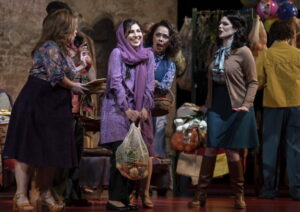
Seattle Opera 2022-23 Review: A Thousand Splendid Suns
Seattle Opera gives a gripping world premiere performance
By John CarrollPhoto: Seattle Opera
What a treat to see a world premiere deliver a gripping operatic experience. Everyone involved in this endeavor earned kudos individually and cumulatively—the vision of what was possible was manifested collaboratively, each creative element building upon the others.
“A Thousand Splendid Suns” is a new opera based on Khaled Hosseini’s best-selling 2007 novel about the resilience of two Afghan women seeking a better future. It’s a large-scale work: 21 adult principal roles sung by 11 soloists, plus a child principal role and over two dozen supernumeraries.
Shelia Silver’s sweeping score is magnificent — dramatic, richly colored, and full of texture and melody. Silver traveled to Afghanistan and immersed herself in Hindustani music, which influenced her lush score with thematic “raga” motifs, undulating drone pedal tones, and the introduction to the orchestra of two non-Western instruments: the bansuri flute and tabla hand drums. What Silver calls the “sound world” of the opera takes the characters and audience on an enthralling journey through a vast array of moods and moments that flow into and out of each other in service of the story: pride, nostalgia, confusion, abuse, jealousy, fear, bravery, love, and redemption. Viswa Subbaraman conducted the large orchestra with panache, forging Silver’s dynamic sonic spectrum into a cohesive, compelling musical story.
Diverse Vocals
The vocal writing had variety—the four lead roles encompassed the four primary voice types and were assigned to characters as expected: a lyric mezzo was the modest wife, a lyric soprano was the young romantic heroine, a lyric tenor was her love interest, and a baritone was the older villain. An array of supporting roles added higher and lower voices to the tonal palette.
Silver asks much of the singers. The major roles are long, the emotions are extreme, and at times the vocal writing is relentlessly acute, especially the very high, very passionate music for Laila and Tariq, the young soprano and tenor lovers. The singers, Maureen McKay and Rafael Moras were up to the challenge, but fewer, more selective excursions into their upper ranges would have given those musical climaxes more significance. McKay’s soprano gleamed brightly, and Moras’s tenor resonated with vibrancy.
As Mariam—the narrative and moral center of “A Thousand Splendid Suns”—Karin Mushegain was superb. It was uncanny watching her transformational arc over 25 years from a naive illegitimate girl celebrating her 15th birthday (followed quickly by her unwanted wedding day) to a battered middle-aged woman who discovers inner courage out of unexpected love. Mushegain’s appealingly human mezzo shifted convincingly from youthful impetuousness to flinty anger to warm acceptance and sacrifice. Mariam is a long complex role, musically and physically, and Mushegain was captivating in every moment of the journey. Her long scene with McKay, whereby the two rival wives realize they can find refuge in each other and change the course of their lives together, was a highlight of the evening.
John Moore was quite good at being bad. His fearless baritone and brusk energy vividly conveyed the repugnant treachery of Rasheed, who brutalizes his two wives.
All the singers in the large cast were of high caliber, but mezzo-soprano Sarah Coit made a special impression. As Fariba, Laila’s mother and Mariam’s friendly neighbor, Coit sang with an uncommonly warm tone and natural musicality. Hers was a completely realized character that earned our empathy. Fariba is a bright energy amidst the drama, and Coit manifested her with grace.
The Adaptation
Hosseini’s novel, here adapted by librettist Stephen Kitsakos, working closely with composer Silver, achieves the ideal with lyrics that are natural yet elevated, both specific and universal, poetry that is the spine of operatic storytelling. I can only imagine how much he had to distill down from this nearly 400-page book that spans 30 years to create a compelling opera that could be experienced in about three hours. The straightforward structure of the story arc was effective, but the pace slowed at times — perhaps if the long love duet was shortened and some other scenes economized, the swell of the plot’s momentum would move ahead unabated. I also question the placement of the act break. Act two begins essentially in the same place in time and energy where Act one ends, with no contextual logic for a long intermission break between them. Instead, the bomb explosion that follows soon after Act two begins strikes me as a great way to close Act one, pausing the story on a dramatic cliffhanger.
The stage director, Roya Sadat, is an Afghan filmmaker. In a twist of fate, she had literally just arrived in Seattle from Afghanistan in August 2021 for initial production planning when the Taliban surged back into power, preventing Sadat from returning home and adding a sharp thrust of political timeliness to the work’s premiere. Fate changed the context of this production: instead of a creative endeavor of joy and pride, Sadat said, “Directing ‘A Thousand Splendid Suns’ at Seattle Opera became an austere obligation to the women of Afghanistan.” She did them proud, creating a production that was visually and dramatically enthralling, where glimmers of hope grow “despite unthinkable adversity, injustice, and the difficulties of womanhood,” as she says in her program notes. There were many indelible moments on stage, but one that stands out came during a transitional moment late in the evening: a dozen women, most holding infants, slowly and determinedly walked along the front of the wide stage in a single file line—where they came from and where they were going was unclear, but one felt the line could have continued forever, with countless courageous women moving forward despite the tyranny that seeks to keep them down.
Rotating Sets Distract
The sandstone colors and wind-worn textures of Misha Kachman’s set evoked the complexion of Kabul’s war-torn face—dry heat, scrappy dwellings, and majestic mountainscapes with violence always on the horizon. The use of a central revolving stage unit started out well, a practical and visually interesting way to change scenes; however, by the second act, it became an annoying distraction as it had turned so many times by then, and a few times seemed unnecessary as it ended up right back where it began.
The most effectively staged scene (its impact partly due to the fact that it did not involve the revolving unit) was the dramatic near-escape by Laila and Mariam at the bus stop in the middle of the night. Jen Schriever’s lighting here was masterful, heightening the tension with a dark midnight sky and sparsity of light coming only from a flickering streetlight, one or two flashlights, and the glow of the tail lights of an old bus that might take the heroines to freedom.



